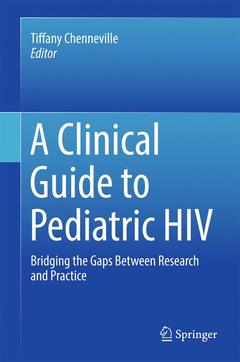A Clinical Guide to Pediatric HIV, Softcover reprint of the original 1st ed. 2016 Bridging the Gaps Between Research and Practice
Coordonnateur : Chenneville Tiffany

- The impact of pediatric HIV on families.
- Psychosocial considerations for children and adolescents with HIV.
- HIV prevention and intervention in the school setting.
- HIV disclosure in pediatric populations.
- How to design effective evidence-based HIV risk-reduction programs for adolescents.
Offers an overview of pediatric HIV epidemiology Explores medical, developmental, and psychosocial issues facing youth with HIV
Discusses unique challenges of pediatric HIV within families, schools, and communities
Explores legal and ethical issues surrounding pediatric HIV
Examines the latest research on such topics as HIV disclosure and antiretroviral adherence
Addresses cross-cultural issues, HIV prevention, and stigma?
Date de parution : 02-2017
Ouvrage de 325 p.
15.5x23.5 cm
Date de parution : 06-2018
Ouvrage de 325 p.
15.5x23.5 cm
Thèmes d’A Clinical Guide to Pediatric HIV :
Mots-clés :
Antiretroviral adherence in children with HIV; Anxiety and depression in youth with HIV; Children and HIV disclosure; Cultural issues affecting youth with HIV; Disease management and children with HIV; Ethical issues and children with HIV; Family interventions and children with HIV; Global trends in pediatric HIV transmission; HIV education in the school setting; HIV-related stigma and children; Legal issues for children with HIV; Medical implications of HIV/AIDS among youth; Neuropsychological deficits in



